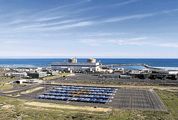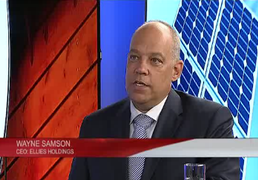Government pensioners file complaint
by Sam Mkokeli and Natasha Marrian,
2016-03-14 05:37:36.0
A GROUP of government pensioners has taken the Public Investment Corporation (PIC) and the Government Employees Pension Fund to the public protector for the "reckless" handling of their money.
They have listed investment in two companies — Lonmin and African Bank — as examples of bad and reckless investments, arguing that it was apparent at the time of the transactions that the companies were facing bankruptcy.
The PIC manages more than R1.5-trillion in assets on behalf of the Government Employees Pension Fund.
This is the second high-profile complaint so far this year concerning the use of government employees’ funds. Early this year, United Democratic Movement president Bantu Holomisa filed a complaint with Public Protector Thuli Madonsela, in which it is alleged that at least R42m from the PIC was channelled to the African National Congress (ANC) to use, among other things, to fund its anniversary bash in January, and pay staff salaries.
But the parties associated with the alleged irregular transactions including the ANC and Deutsche Bank, which allegedly processed the transaction, denied the allegations. Ms Madonsela’s office has started a preliminary investigation.
In the latest complaint, Cape Town-based pensioner Petro Stemmet wrote to Ms Madonsela on behalf of fellow pensioners. His letter of complaint lists a number of cases in which the PIC allegedly invested in companies that were about to go bust. Mr Stemmet — a former prosecutor and stand-in magistrate — told Business Day on Friday that the group felt strongly that the people who knowingly made extremely risky decisions should be made to account.
Mr Stemmet said their complaint was prompted by Mr Holomisa’s action. The pensioners have asked that Ms Madonsela join the two complaints, so that a probe could be done simultaneously.
"As an example, we are of the opinion that investments in African Bank (Abil) were dealt with in a reckless way, culminating in a loss of R4bn." Mr Stemmet said they had been concerned in the past three years about "bad investments", or those that were not in the interest of the workers.
"Bad investments are understandable. Everybody makes bad investments — I have made a lot myself — but these are very risky investments made with money of the Pension Fund. If I can refer to African Bank, for instance, investors had been warned for years and years not to invest in a company that faces bankruptcy."
Mr Stemmet said in Lonmin’s case, the PIC held a 7% share, but increased its shares to 29.99% in 2005 "when this company experienced serious financial problems, with an original share price of R4 that later fell to 11c and, thereafter, a regroup of shares to a value of less than 2c per share".
PIC CEO Daniel Matjila said the company had not been approached by Ms Madonsela’s office regarding this complaint, but that we "will give our full co-operation" should she investigate.
Congress of South African Trade Unions president Sdumo Dlamini said the labour federation was preparing for a bigger battle about the way workers’ pension savings were being handled.
"Brace yourself for a bigger talk and a battle on this issue of pension funds," he said.

Picture: THINKSTOCK
A GROUP of government pensioners has taken the Public Investment Corporation (PIC) and the Government Employees Pension Fund to the public protector for the "reckless" handling of their money.
They have listed investment in two companies — Lonmin and African Bank — as examples of bad and reckless investments, arguing that it was apparent at the time of the transactions that the companies were facing bankruptcy.
The PIC manages more than R1.5-trillion in assets on behalf of the Government Employees Pension Fund.
This is the second high-profile complaint so far this year concerning the use of government employees’ funds. Early this year, United Democratic Movement president Bantu Holomisa filed a complaint with Public Protector Thuli Madonsela, in which it is alleged that at least R42m from the PIC was channelled to the African National Congress (ANC) to use, among other things, to fund its anniversary bash in January, and pay staff salaries.
But the parties associated with the alleged irregular transactions including the ANC and Deutsche Bank, which allegedly processed the transaction, denied the allegations. Ms Madonsela’s office has started a preliminary investigation.
In the latest complaint, Cape Town-based pensioner Petro Stemmet wrote to Ms Madonsela on behalf of fellow pensioners. His letter of complaint lists a number of cases in which the PIC allegedly invested in companies that were about to go bust. Mr Stemmet — a former prosecutor and stand-in magistrate — told Business Day on Friday that the group felt strongly that the people who knowingly made extremely risky decisions should be made to account.
Mr Stemmet said their complaint was prompted by Mr Holomisa’s action. The pensioners have asked that Ms Madonsela join the two complaints, so that a probe could be done simultaneously.
"As an example, we are of the opinion that investments in African Bank (Abil) were dealt with in a reckless way, culminating in a loss of R4bn." Mr Stemmet said they had been concerned in the past three years about "bad investments", or those that were not in the interest of the workers.
"Bad investments are understandable. Everybody makes bad investments — I have made a lot myself — but these are very risky investments made with money of the Pension Fund. If I can refer to African Bank, for instance, investors had been warned for years and years not to invest in a company that faces bankruptcy."
Mr Stemmet said in Lonmin’s case, the PIC held a 7% share, but increased its shares to 29.99% in 2005 "when this company experienced serious financial problems, with an original share price of R4 that later fell to 11c and, thereafter, a regroup of shares to a value of less than 2c per share".
PIC CEO Daniel Matjila said the company had not been approached by Ms Madonsela’s office regarding this complaint, but that we "will give our full co-operation" should she investigate.
Congress of South African Trade Unions president Sdumo Dlamini said the labour federation was preparing for a bigger battle about the way workers’ pension savings were being handled.
"Brace yourself for a bigger talk and a battle on this issue of pension funds," he said.

























Change: -0.79%
Change: -0.78%
Change: -0.34%
Change: -0.40%
Change: -2.75%
Data supplied by Profile Data
Change: -0.63%
Change: -0.60%
Change: -0.79%
Change: 0.00%
Change: -0.67%
Data supplied by Profile Data
Change: 2.41%
Change: 1.65%
Change: 2.60%
Change: 3.38%
Change: 2.02%
Data supplied by Profile Data
Change: -0.19%
Change: 0.10%
Change: -0.59%
Change: -0.71%
Change: -3.12%
Data supplied by Profile Data